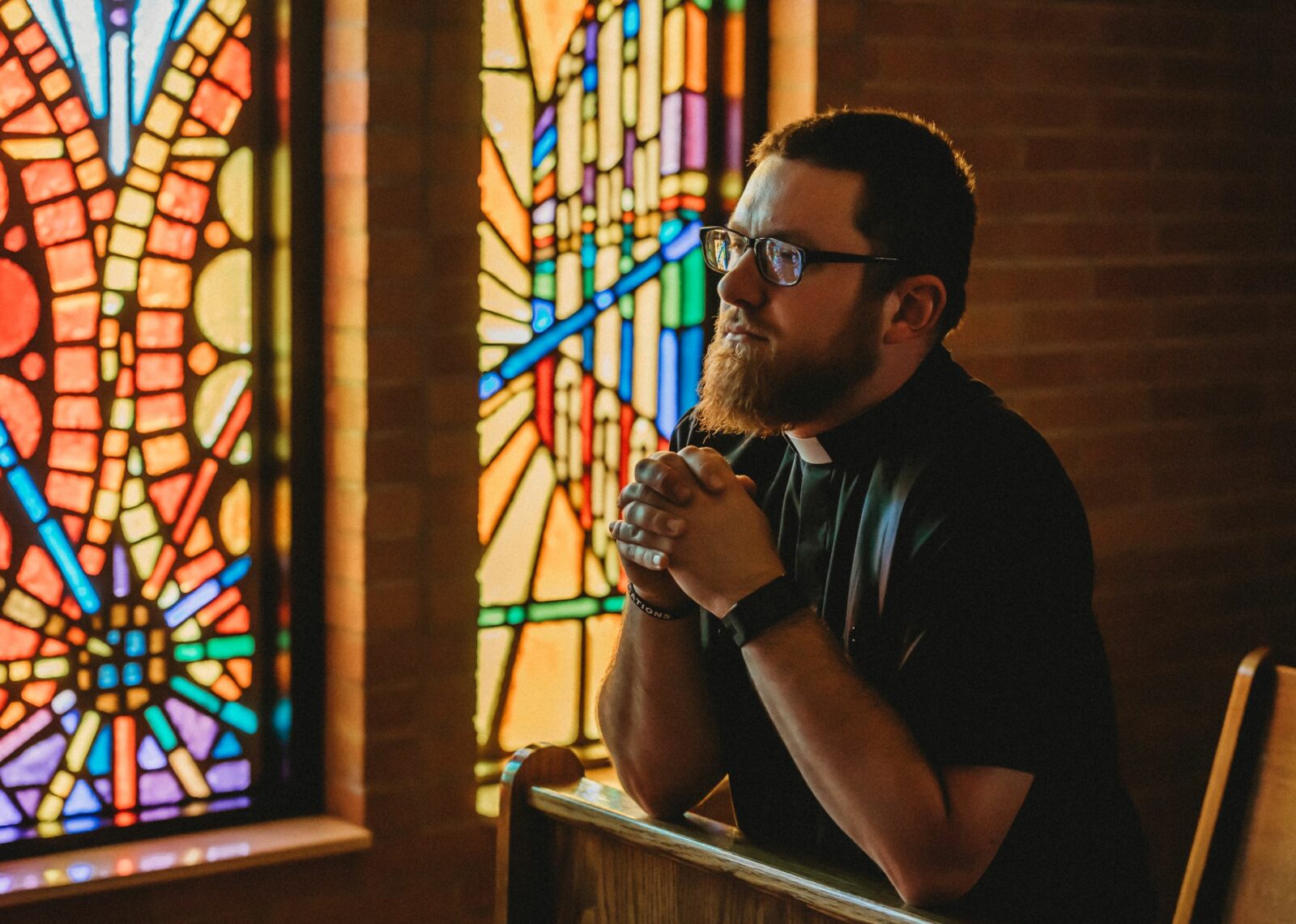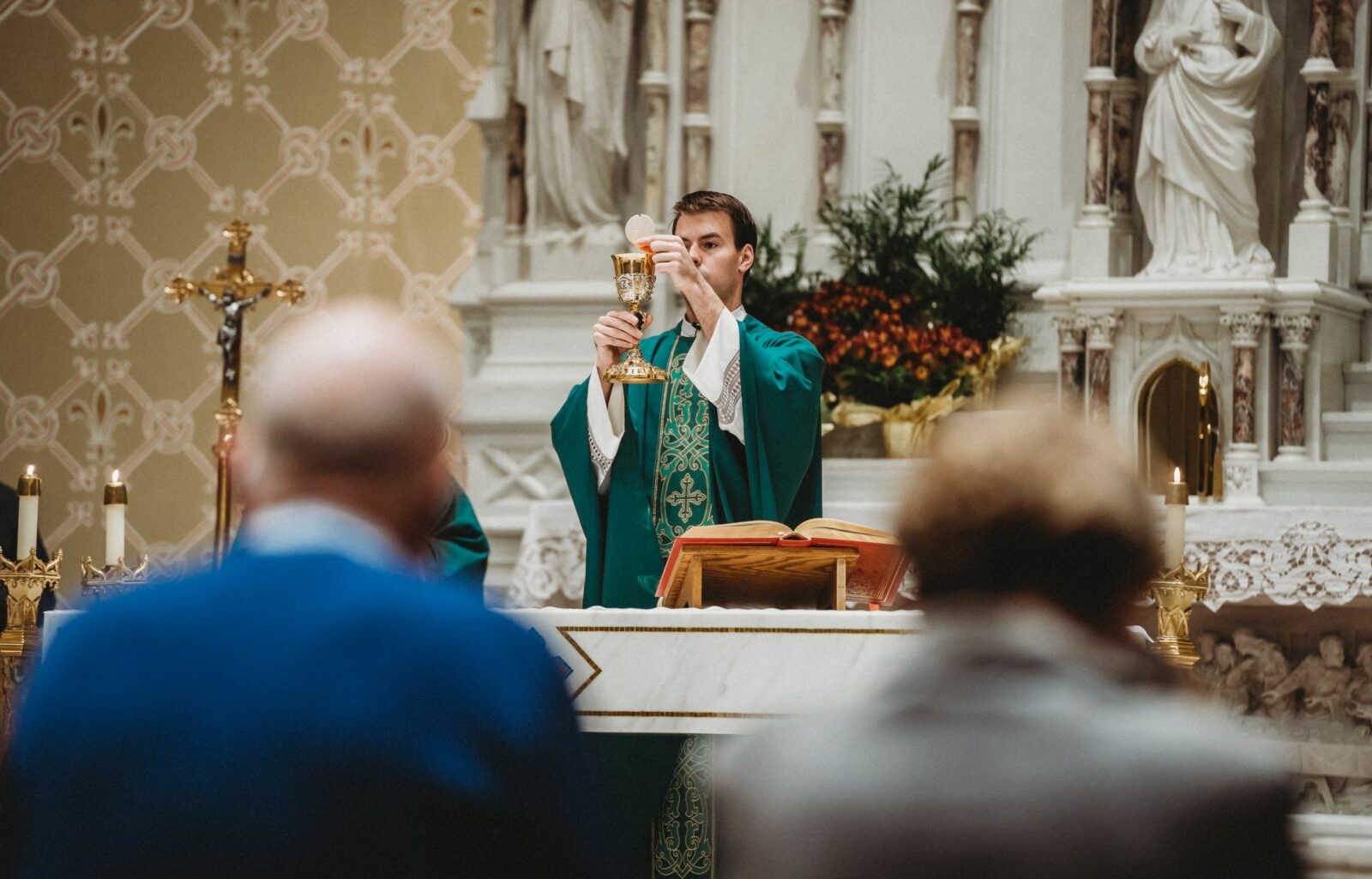FAQs about Discernment
Posted in Discernment, Explore More, Frequently Asked Questions
Get the answers to your most frequently asked questions about discernment.
HOW DO I DISCERN?
The best first step in this sometimes difficult process is to follow the words most spoken in the Holy Scripture, “Be not afraid!” Whether it was an angel announcing good news, or Christ speaking to His disciples, setting aside your fear is the first step. Once you are open to hearing the Lord speak to your heart, a message that will most likely come as a quiet whisper, you will be able to truly discern, figure out, “Lord, where are you calling me to serve you in this life?”
Discernment must involve prayer, the willingness to seek out quiet in an otherwise noisy world, a desire to know God’s will for your life, and a love for the Church and all Her members. Discernment is the first step in coming to know if the Lord is calling you to serve him as a Roman Catholic priest.
“Christ is knocking very hard at many hearts, looking for young people like you to send into the vineyard where an abundant harvest is ready.” – St. John Paul II
What are the Steps for Discernment?
While there are several methods of discerning God’s calling in your life, the following steps will hopefully assist you with this process:
You must have a personal relationship with Christ
As Pope Benedict XVI states: “The seminarian experiences the beauty of God’s call in a moment of grace which could be defined as ‘falling in love’….It is only when a young man has had a personal experience of Christ that he can truly understand the Lord’s will and consequently his own vocation.” Have you fallen “in love” with Christ?
Pray for guidance from God
God has a plan for everyone and following God’s plan will lead to true happiness. Allow the Lord to lead you and have trust that He will only desire what is best for you. It is then that you will find true happiness and fulfillment in life.
Pay attention to the gifts and talents you’ve been given by God
God has blessed each of us with many gifts and talents, distinct to every person. Have you allowed yourself the ability to consider that these gifts that you have been blessed with from God could be used to serve the Church?
Pray before the Blessed Sacrament for guidance
The Real Presence of our Lord Jesus Christ in the Eucharist is the “source and summit” of our Catholic faith. What better place to spend time in quiet reflection and adoration then in the presence of our living God? “This is Jesus here. This is God. And priests exist to make him sacramentally present to the faithful.” Seek out a parish that has an adoration chapel and enjoy your time of grace in the presence of the Blessed Sacrament.
“Vocations are born in prayer and from prayer; only through prayer can they persevere and bear fruit.” – Pope Francis
Ask the Blessed Mother
A devotion to the Blessed Mother is the surest and safest way to your vocation. Just as she was the way Jesus chose to come to us, so too, she is the way to go back to Jesus. She will protect, guide, and perfect our prayers and bring them before her Beloved Son. The Rosary is a powerful prayer for any man trying to discover his vocation.
Seek advice from a priest
While many people are well equipped to assist you in your discernment of a priestly vocation, there is no substitute for a priest. Whether it is one of your parish priests, a spiritual director, or friend, the advice and direction received from a priest will be extremely beneficial in your discernment of a calling to the priesthood of Jesus Christ.
Receive the sacraments of Eucharist and Reconciliation
Regular reception of the Eucharist, definitely every Sunday and preferably every day if your schedule allows, will afford you the opportunity to stay in communion with the “Word made Flesh”. Unlike other food, the more you receive the Eucharist, the more you become like that which you consume. The sacrament of Reconciliation reminds you that we are all sinners and always in need of God’s merciful forgiveness. The more we receive forgiveness for our sins, the better we can configure our lives to Christ.
Know God, know true peace
True peace will be felt in your heart when you come to know God as an intimate friend. This peace will also lead to an affirmation that what you are experiencing emotionally in regards to your discernment of the priesthood is from God. Knowing what and where God wants you to be will come with an overwhelming sense of peace.
Look to Jesus as the model for all decision making.
“Father…not my will, but Yours be done.” (Luke 22:42) By seeking God’s perfect will, life to the fullest will be experienced. Jesus always followed the will of His Father, are we not called to do the same?
Be involved in the life of your parish
An excellent way to experience the life of a parish priest is to involve yourself in the life of a parish…..which is the life of a priest. Consider being an Extraordinary Minister of the Eucharist, Lector, Catechist or a member of a Committee, Commission or Council. The more you know about the life of a priest, the better you will be able to discern.
Why is discernment important?
The process of making a decision about your life with the help of the Holy Spirit is called “discernment.” It is the process of discovering God’s will for you. “Ultimately, our vocation consists in God calling us to consummate loving union with the Father, Son and Holy Spirit for all eternity.”
As you begin, remember that both you and God ultimately desire the same thing – your happiness. You want to make a decision about your life that will bring you happiness.
Therefore, you and God are not working at cross-purposes, but for the same goal. Discernment is a gift from God, assisting you in the ability to “come to know, identify or recognize one thing as distinct from something else.”
Discernment begins with the ability to ask without fear, “Lord, how can I best serve you?” Only after you are willing to ask this question can true discernment begin.
Some of the discernment programs that are offered through the Office of Priestly Vocations:
Discernment Weekends
This is for men who are 18 to 55 years of age. There are three Discernment Weekends each year and they all take place at Sacred Heart Major Seminary. During a Discernment Weekend, you will be given an opportunity to worship with the seminary community, meet the seminarians and faculty, attend a seminary class, meet other men considering the priesthood, learn how to better discern a priestly calling, and spend time alone in prayer.
Discernment Days
This is for young men, high school freshmen-seniors. A Discernment Day gives a young man the opportunity to interact with seminarians, receive direction about how to best discern a priestly vocation, learn more about the seminary, and spend time in prayer and reflection. We have two Days each year, one in the Fall and the other in the Spring, and they are also hosted at Sacred Heart Major Seminary.
There are no fees or obligations to come to a Discernment Day. Attending a Day is certainly not a commitment to enter the seminary. But it is an excellent opportunity to take an honest look at the possibilities seminary life may hold for you.
Evening Prayer and Dinner with Archbishop Vigneron
The Evening Prayer and Dinner is for single men, between the ages of 16 – 55 years old, seeking a better understanding of their vocation from the Lord. It takes place at Sacred Heart Major Seminary in Detroit. There will be Evening Prayer in the chapel followed by dinner which will feature presentations focusing on the different aspects of discernment. The featured speaker is Archbishop Allen H. Vigneron.
Discernment Groups
Discernment groups are for men 18-55 years old, to meet for times of prayer, presentations on discernment, and light refreshments and fellowship with other like-minded men.
Can I still be a priest if I feel I’m not very holy?
Holiness (to be like Jesus) is a lifetime endeavor for every person in every vocation. Don’t worry if you don’t see yourself as very holy right now. God will form you slowly, day by day and week by week, so that you will be ready to be His instrument when the time comes. But for now, use the sacrament of Penance at least once a month. Repent of your sins, receive the sacraments, and pray every day. You will be surprised at how Christ-like you can become!
What does a priest do?
The purpose of a priest is to bring people to Jesus, and Jesus to people. He does this primarily by preaching the Word and offering the Holy Sacrifice of the Mass. His daily life involves administering the sacraments — Baptism, Confirmation, the Eucharist, Penance and Reconciliation, the Anointing of the Sick, and Matrimony (Holy Orders is reserved for bishops to administer) — and caring for the people in their daily needs.
Is it easy to become a priest?
No, it is definitely not easy! A man who wants to become a priest must go to college for four years, with at least two years of philosophy. After graduating from college, he must go to a seminary for another four years to earn a master’s degree in divinity. Most men go to school eight to ten years after high school, before they are ordained a priest! But do not let this discourage you. God always gives us the grace to do what He asks us to do.
Are most priests happy in their vocation — in their lives and in their work for Christ?
Most priests are extremely happy in their vocation! The life of a priest is a very rewarding life, both in this world and in the next. The media often gives an incorrect impression of priests… that they are largely unhappy, frustrated, and angry. This is simply not true. A recent nationwide poll was conducted of priests and 87% report being very satisfied with their vocation…..the highest such statistic of any profession!
How do I know what God is calling me to do?
You must pray every single day, asking God to reveal His plan for you. Do not ask yourself, “What do I want to do when I grow up?” This is the wrong question! Rather, you should be thinking and asking: “Jesus, what do You want me to do?” And listen for the answer! The primary area of revelation is the heart. Listen with your heart!
The discernment process in the priesthood must also include the Church. The local bishop is the one who ultimately decides who is and who is not called. He is assisted in this by the Vocation Office and the seminary. This whole process is called “discerning one’s vocation.”
Can I be happy in my life if I do not follow God’s plan for me?
If you do not follow the vocation for which God made you, you can attain a certain degree of happiness in this world and still attain salvation (go to heaven), but you can never be as happy as you might have been had you followed your proper vocation. This is why it is so important that you discern correctly. Of course, there are trials and tribulations in every vocation. To become a priest does not take away all suffering. But there is great joy in laying down one’s life for Jesus!
If I am attracted to the priesthood, does that mean that God is calling me to be a priest?
Possibly, but not necessarily. A man must pray a great deal, listening with both heart and soul to know what God wants him to do. But if you feel some attraction at this point, just continue to pray, go to Mass, and live a Christian life. If you are living a Christian life, Jesus will let you know when the time comes. Also, go talk with your parish priest or with the vocation director. Try to come to the diocesan-sponsored retreats and discernment events. The vocation director can help you determine if God is calling you to the priesthood.
Do priests get paid?
Yes. Since a priest does not have a family and because he lives a simple life, he does not need a lot of money. However, priests do receive a salary, which provides him with enough money to buy the necessities, to buy and maintain an automobile, to take a vacation, and to do normal recreational activities. Also, priests don’t have to pay for housing, food, and insurance, so their expenses are minimal.
Why can’t priests get married?
Catholic priests in the Latin Rite do not get married so as to dedicate themselves completely to Jesus and to His people. Priests generate “spiritual children” by bringing many souls to Christ and helping them to grow in holiness so that they can one day live forever in Heaven. The sacrifice of celibacy (not getting married) is a sign to the world that only Jesus can give us the happiness that we all so crave. Giving up something as important as marriage and family is a powerful sign to the world that Jesus Christ is real! He is worth living for and sacrificing for completely. No, it is not easy, but neither is marriage. The fact is, every vocation requires great personal sacrifice. And there is great joy in sacrifice when it is done for Jesus and for others!
Will priests ever be allowed to get married?
It is possible that this law of the Church will one day be changed. If the Holy Spirit wants this change, He will affect it through the Pope and bishops of the world. However, it would be a grave mistake to go to the seminary “expecting” this change. That would be setting oneself up for a big disappointment, should it not happen.
What happens when you contact the Vocations Director?
Feel free to call confidentially, and ask any question you like. Give as much or as little information about yourself as you choose. It’s a normal part of a vocation director’s job to talk to guys at all levels of discernment.



